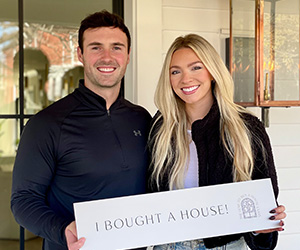Buying your first home can feel overwhelming, but it doesn’t have to be. One of the most common misconceptions is that you need a massive down payment or perfect credit to get started. In reality, a wide range of programs exist to make buying your first home more accessible, from grants and low-interest loans to down payment assistance.
These are the very topics we cover during our free home buying classes, led by real estate professionals who simplify the process and answer your questions along the way. Whether you’re just getting started or already house hunting, knowing your options can make all the difference.
Federal First-Time Home Buyer Programs
FHA Loans
Backed by the Federal Housing Administration, FHA loans allow down payments as low as 3.5% and are generally more flexible when it comes to credit score requirements. This makes them a popular choice for new buyers.
VA Loans
If you are a veteran, active-duty service member, or eligible surviving spouse, a VA loan offers one of the most generous paths to homeownership, requiring no down payment and no private mortgage insurance (PMI).
USDA Loans
Designed for rural and select suburban areas, USDA loans offer zero-down financing for moderate-income buyers. Many areas qualify under USDA guidelines—even some you might not expect.
First-Time Buyer Grants & Down Payment Assistance
Down Payment Assistance (DPA) Programs
Many states, counties, and cities offer down payment assistance through second mortgages, forgivable loans, or outright grants. These programs are typically targeted at buyers who meet certain income or location-based criteria. Some highlights include:
- Assistance amounts up to $15,000.
- Help with closing costs.
- Interest-free repayment options.
First-Time Buyer Grants
Grants don’t need to be repaid, making them the gold standard for financial support. These are often offered through:
- State Housing Finance Agencies (HFAs).
- Local nonprofit organizations or city programs.
- Employer housing benefit plans.
Tax Credits and Incentives
Some states offer Mortgage Credit Certificates (MCCs), which allow you to claim a portion of your mortgage interest as a tax credit. This can translate into thousands of dollars in savings over the life of your loan.
Local Programs That Are Easy to Miss
Your city or county may have lesser-known but highly valuable programs. These may include:
- Incentives based on zip code or neighborhood
- Benefits for teachers, healthcare workers, or first responders
- Income-based programs with partial loan forgiveness
For example, some municipalities run “Welcome Home” or “Live Where You Work” programs that offer cash incentives for buying within city limits.
Tip: Contact your local housing authority or speak with a HUD-approved counselor to explore your local options.
You Might Qualify Without Realizing It
Many people are surprised to learn that the term “first-time buyer” often includes anyone who hasn’t owned a home in the past three years. Even if you’ve owned a home before, you might still be eligible for programs designed for first-time buyers.
Where to Start
- Research your eligibility for FHA, VA, or USDA loans.
- Contact your state’s Housing Finance Agency.
- Talk to a lender or real estate agent about local assistance programs.
- Combine available programs with your own savings plan.
These are precisely the types of strategies we walk through in our How to Buy a House classes. Our goal is to make the process feel approachable, doable, and tailored to your financial situation.
Final Thoughts
First-time home buyer programs exist to help, whether that means grants, low-interest loans, or down payment assistance. You do not need perfect credit or a large down payment to get started. You just need the right information and support.
Want to take the next step with confidence?
Join one of our free, expert-led home buying classes. You’ll walk away knowing your options and how to move forward—smartly.







